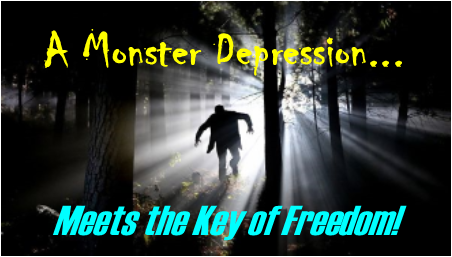I was face to face with a monster. The sweet, sad soul opposite me was being squeezed relentlessly by a monster depression, and had been off and on for years. By now, it had rendered him utterly hopeless and physically homeless, barraged hourly by thoughts of stabbing himself. How could I position him for the Lord to set him free? What would you have done?
You may ask: Was he a Christian? Yes, but being a Christian can make depression worse, if our thoughts go like this: “If God loves me, why is He letting me go through so much pain? Doesn’t He care? Is this just my fate?” This brother had been praying for relief from the depression for years. There had even been a season of relative freedom from it when he was reading his Bible and watching Christian TV practically around the clock. That kept it at bay. Then, some fresh disappointment set in and it came back with a vengeance.
A Better Question
You should ask: Was he a believer? Ah, now that’s the real issue! He would tell you (as he told me) that he was indeed a believer. He believed in God and he believed in the Bible. I said, “That’s good, but so do the demons. And they aren’t taking any joy or peace from knowing who God is either.” You see, my “job” was to try to help him see that although he believed in God and Jesus, he was certainly NOT believing the truths about God that he most needed to be believing. This was not to condemn him or make him feel worse about himself, but to show him the true way of escape.
For better or worse we are the ones in charge of our own hearts. The Lord has given us the power to choose what we will believe and that is the deciding issue. If I choose to work at believing what God tells me is true, then my heart will begin to float free of any negative issue that seizes my emotions. Truth has that kind of liberating power. But if I choose to believe something that is not entirely true (about God, or myself, or my life for example), then the lie embedded in those half-truths will sink me every time.
The Power of Unbelief
It only takes a little bit of unbelief to block a whole lot of faith. Depression is an issue of unbelief. For instance, you cannot actively believe that God’s plans for you are good (to give you a future and a hope) and feel hopeless at the same time.
In fact, his first breakthrough came at exactly that point. I read him Jeremiah 29:11-13 and he realized that he could actually feel some hope that God had good plans for him. What’s more he saw that he had previously NOT been believing it—even though he had been saying he believed the Bible. The light of Christ penetrated the deep darkness of his pit of depression. It was a slender beam, but by it he began to see the monster that bound him.
Unbelief steals upon us disguised as depression. I call it the “Silent Killer,” because its victims never notice it for what it is. Lust, anger and fear are easy to sense and identify. The only way you can “feel” unbelief is through the feeling of depression. By then you think that the depression itself is the problem.
A Second Release
When I saw him the next day the enemy had come in like a flood. Walls of despair barricaded him, fending off all attempts to recover hope. None of my words made a dent in it, so we prayed. Then the Spirit of the Lord came into the room and something lifted. That was the second breakthrough. Depression loves to cocoon its prey in the lie that it is here to stay, that the feelings will never change, that it is useless to resist.
Thankfully, he had seen light a second time and by it he saw that he had (unwittingly) closed his heart to God due to that past disappointment. As He opened back up I saw a marvel: His wings of faith unfurled. His hands reached for the sword of the Word. His whole spirit came alive with fresh desire to face the challenges of his life with faith in his God to sustain him. Faith resurrected out of the ashes!
About the Author: Steve Evans
 For over a decade Steve Evans and Healing Streams have been helping people recover inner peace and freedom. Find out how to gain mastery over negative emotions and live with childlike freedom of spirit by taking his completely free "eCourse for Healing" at healingstreamsusa.org. Get started now!
For over a decade Steve Evans and Healing Streams have been helping people recover inner peace and freedom. Find out how to gain mastery over negative emotions and live with childlike freedom of spirit by taking his completely free "eCourse for Healing" at healingstreamsusa.org. Get started now!

